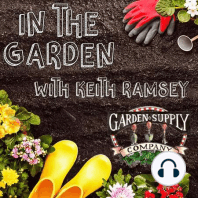15 min listen
Yearly Maintenance
FromIn The Garden
ratings:
Length:
9 minutes
Released:
Sep 27, 2022
Format:
Podcast episode
Description
Keith Ramsey: [00:00:00] Hey, Keith Ramsey with the garden supply company. I wanted to outline yearly maintenance things we do at our house and recommendations for people. People always call in the middle of spring and want mulching done, that kind of thing. And just laying it out the way I think it should be.Mulching is a, from a company standpoint, if you're paying somebody to do it, it's always an off-season thing. It fills a void when companies are slow. But if you're digging into a mulch pile, that's a hundred degrees. You also don't want to do it in spring or summer heat.And the plants have already broken ground. Perennials are starting to come up, so you're mulching around them. It's something that, that I always recommend that people, [00:01:00] mulch and then and then power wash, get cleaned up for spring. So you know, planning to do that kind of thing.So in the wintertime. Doing some of your plantings, ordering seeds, picking out plants at a garden center, starting to come up with your plan, and then planting in the winter is ideal. So if you do big planting, go ahead and get that out of the way. Disturb the dirt, get, pick your plants out and get the big stuff done while it's fantastic.And the plants can acclimate to the soil. They don't require a lot of water. And then get your mulching done and get it done ahead of daylilies and perennials and stuff like that. That's going to come back up, it can come through the mulch, and it just has a nice, fresh look, and you're ready for spraying.Instead of playing catch up, you're mulching around many different things or mulch, and then try to come back and put plants in. Joe Woolworth: do most people remove last year's mulch or whatever's left, or throw it right on top? Just throw it Keith Ramsey: right on top.[00:02:00] Every once in a while, I like to switch the mulch up. I think it's good for the soil. So if I've used hardwood mulch three or four, three or four times, I'll sometimes switch it up to pine straw to give it a different product going into the soil. But all that stuff, microbes break them down, and they'll build the soil.Mulch is a little bit slower to break down. If I'm trying to get rid of mulch or if it's built up, you should put enough down that there would be a lot left on the ground. If you have Joe Woolworth: a lot of weeds in your mulch bed. Do you put it down? Paper. Yeah. So you can put Keith Ramsey: down paper Joe Woolworth: do you put that right over the old mulch?Or do you have a dig that up or just, you can Keith Ramsey: yeah, just put it right over the old mulch and then put mulch on top. There are lots of new organic chemicals out that you can spray that are A broad. It's going to kill any wide leaps or grassy weeds.So you can spray weeds. You can also apply pre-emergence before you do the mulch. But brown newspaper paper, packing paper, that kind of stuff. If you can put it down over the top of weeds and then mulch it out, it really [00:03:00] helps, but pre-emergence is something that if you put it down twice in the spring and once in the.You can eliminate about 90% of the weeds you have to pull. Which I think is an excellent way, too. My pre-emergence makes pulling weeds fun. When you're getting into spring, I always say you've got your mulching done. Having a prepped annual bed that you change out regularly is super easy.And it gives you that color that carries you through as perennials come and go. Perennials are probably one of the more popular things we sell these days because they correspond with pollinator plants, which are super easy to put in the spring-summer.You can plant 12 months out of the year, but filling in some holes by adding new plants and various native plants is perfect for pollinators. I've recently told people to plant flowers for pollinators and pollinator habitats.And then you'll have hummingbirds, that kind of thing. Show up in your yard. You don't [00:04:00] necessarily have to feed the hummingbird if you want to d
Released:
Sep 27, 2022
Format:
Podcast episode
Titles in the series (51)
Fescue Lawns: In this episode, Keith talks about preparing the soil to plant or over-seeding a fescue lawn, the planting process, and maintaining it. by In The Garden
